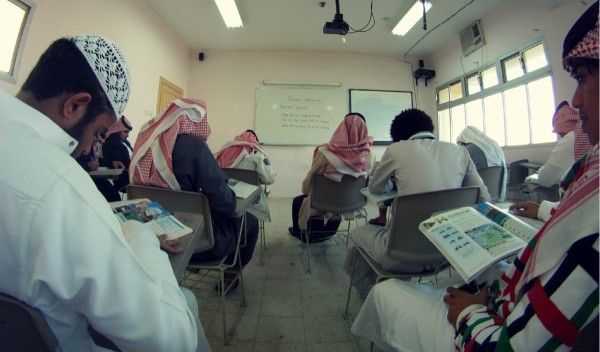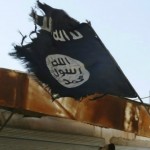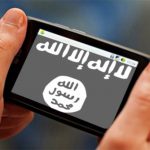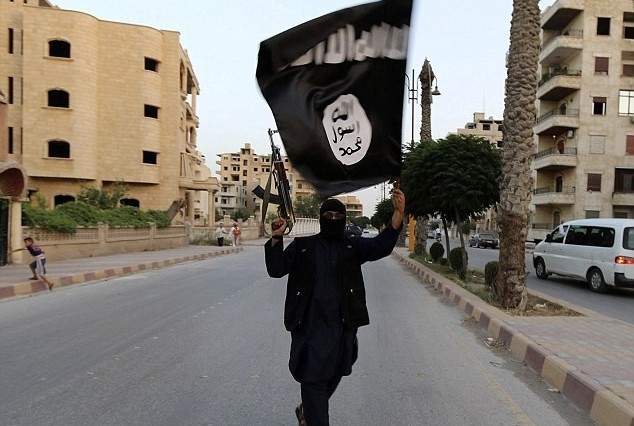by Emile Nakhleh
According to an article published Oct. 21 on Al-Monitor, the Islamic State (ISIS or IS) has issued new regulations for the school systems under its control in Iraq and Syria. The announced purpose of the so-called guidelines, which carried the imprimatur of the group’s “Amir al-Mu’minin,” presumably leader Abu Bakr al-Baghdadi, is to “eradicate ignorance and disseminate Sharia sciences.”
Although the “guidelines” are extreme, controlling, and regressive, some of the key elements in IS educational program are similar to what one finds in Saudi textbooks, especially those that are taught in Saudi public middle and high schools. The ideological foundations of Saudi public school education are based on Wahhabi-Salafi-Hanbali theology.
One key difference focuses on the nation-state. Whereas Saudi education accepts the Saudi and other Arab and Muslim states, with recognized boundaries and national ethos, IS rejects national boundaries within Dar al-Islam, or the Abode of Islam, and individual states. Instead, it calls for one Islamic State or a “Caliphate.”
The new guidelines call on teachers to emphasize creationism, reject Darwinism, eliminate music and the arts, teach history from a Sunni-Islamic perspective, discard modernity, and of course segregate the sexes.
Saudi Textbooks
Much of IS’s educational “curriculum” finds its roots in Saudi textbooks, especially at the middle school and high school levels. Arabic, literature, history, civic education, cultural values, and norms of behavior—whether in a home or societal setting—are all taught according to a particular interpretation of Sunni Islam.
The Wahhabi-Salafi-Hanbali interpretation also permeates religion or theology classes, especially those that focus on elements of Sharia, fiqh (jurisprudence), or the Hadith. The biological and physical sciences are taught from a pre-ordained creationist perspective, which rejects modernity in favor of traditionalism.
Science experiments are allowed with the understanding that the doctrine of “Tawheed” or “Oneness” of God permeates the universe. God created everything and every creature. There is no “Big Bang” theory and no evolution of the human, animal, or plant species.
Even the geography curriculum discusses the region from an Islamic perspective. For example, kids are taught that the “Zionists” have occupied Palestine illegally, and the Islamic umma one day must re-establish Muslim control over Jerusalem, the “Third Qibla” of Islam, to which Muslims turn to pray after Mecca and Medina. “Israel,” for example, does not appear on maps of the Arab world in Saudi geography textbooks.
The Saudi curriculum, much like what IS is urging Syrians and Iraqis under its control to teach and preach, imparts to the youth a narrow-minded, conservative, traditional worldview. It is intolerant of other religions and even of other sects in Islam. Oftentimes, Shia Muslims are considered “apostates,” or “rejectionists,” and could be subject to discrimination and even death. The Shia in Saudi Arabia and Bahrain are excluded from key government, defense, and national security positions.
The Saudi youth are socialized in public schools on the importance of Islam in the personal, familial, social, and national levels. Whenever Islam, as a faith and a territory, is threatened or invaded, Muslims have a duty to do jihad against the perceived “enemies” of Islam.
Saudi education espouses this ideology, so do al-Qaeda and IS. In the past three decades, Muslim youth have participated in large numbers in jihad across the Muslim world, from Afghanistan to Chechnya, and from the Balkans to Iraq and Syria.
The Saudi government participates in the anti-IS coalition, yet IS’s jihadist ideology resonates with Saudi educated youth. Their government talks about a possible peace with Israel should it withdraw to the 1967 borders, yet Saudi youth do not see Israel on the maps in their textbooks.
If the Saudi youth are taught about the duty of jihad in the face of a “war on Islam,” as Bin Ladin had preached for years, and view IS rightly or wrongly as the “defender” of Islam, they can’t understand why their government is fighting on the side of Islam’s “enemies.”
This is particularly poignant, especially since some Saudi clerics have strongly endorsed the type of educational curriculum that is currently being pushed by IS in Iraq and Syria.
Textbooks play a central role in educating and socializing Saudi youth and many of their teachers. Many Saudi grade school teachers do not have a college degree and rely on the textbook to guide them through the course. Those who are college graduates usually receive their degrees from teachers’ colleges, which teach a curriculum heavily imbued with Islamic studies and Arabic language, grammar, and literature.
The ministries of education and religious affairs, which are heavily staffed by Salafi Islamists, approve the curriculums and have the final say on what’s taught in schools.
Teachers are not allowed to stray away from the textbook or offer analytic judgments or opinions either on the material in the text or current issues that might relate to the subject under discussion. Both teaching and learning are done almost by rote memory. No critical thinking is allowed and no logical extrapolation is encouraged.
Teachers and students accept whatever interpretations are offered in the textbooks, especially if such an interpretation is attributed to the Koran, the Hadith, or Sharia. Such attributions and religious quotations permeate the textbooks regardless of the subject matter.
Policy Implications
So what if the educational curriculum of IS tracks with Saudi education? Should the US and other countries do anything about it, and can they?
Several years back, I briefed senior policymakers in the United States and other countries on the Saudi curriculum, the jihadist message it transmits to youth, and the radicalization that was sure to follow. It was “actionable” intelligence in that Western diplomats could speak to Saudi leaders about a very specific problem, which they could address.
According to media reports, Saudi officials were amenable to review their textbooks with an eye toward softening the Islamist message. Unfortunately, not much was done.
Saudi clerics objected to any revisions of the textbooks on the grounds that non-Muslim outsiders were interfering with religious teachings in the kingdom. Some of them went even further to depict suggestions along these lines as a “conspiracy” against Islam. Western diplomats, who had pushed the issue, backed off.
Other interests in recent years—including Iran, Iraq, the aftermath of the Arab Spring, counterterrorism, commerce, oil, arming anti-Assad jihadists, and more recently, building a coalition against IS—have in all candor trumped Western interests in “reforming” Saudi textbooks.
I argued in previous articles on this blog that although IS is defeatable and containable, the ideological root causes must be dealt with. Otherwise, other Islamist terrorist organizations would rise on the ashes of IS.
The latest educational “guidelines” issued by the Islamic State are a stark example of what’s wrong with our strategic policy planning on the root causes of terrorism. Discussing Saudi textbooks is the first step toward “degrading and defeating” IS.
Photo Credit: MPH’s blog, Saudi-Season






Interesting post. But IMHO, the elites here in the U.S. won’t listen to you, anymore then they have in the past. The whole system is if a free for all, one that comes from a vacuum of leadership at the top, which has allowed the lower dangerous elements to call the shots, ones that have that superiority complex-delusional denial personalities. The U.S. will continue stumbling along like the drunken sailor it imitates, until the booze runs out. Perhaps this present world situation it finds itself in, is the precursor to the hangover that will come about through all this meddling in the affairs of other countries in the quest to be top dog.
I fully agree with that analysis. The cancer is inside Saudi Arabia and has become part of the genome of young Saudis. The system has been dominated by a powerful and corrupted tentacular family, leaving no chance to a non elite Saudi to reach any political role. Sunni religion is used to shut any dissidence.
In country where art is forbidden and culture is limited to rigid and outdated bedouin traditions what can be expected from a youth except to be addicted to mobile phones, games, money and sexual fantasy. They live in a boring society and the ones who suffocate end up by joining religious extremism that at least gives them dignity and a meaning to their life.
It is increasingly necessary that this country go through a revolution. Yet the cowardice of most Saudis and the support the USA is keeping the system as it. It makes it impossible for a youth to confront the system. He can only his dissidence by joining al Qaeda, which he perceives as just a more heroic and adventurous form of the Wahhabism he has been taught at school.
The article offers the best guidance I see in Media Outlets for our leadership. I hope President Obama sees the light! The author is endowed with a insight miles above all Think Tanks combined!
It is time to also ask who created 9/11. Was it Saudi Arabia and other stone-age Arab kingdoms or the racist Israeli or both?
Time is right to come to solid agreement with Iran soon if the President intends to have a single powerful and trustable ally in the troubled Middle East. We needed Iran yesterday unless we intend continue listening to the AIPAC and other spies for Israel!
Great analysis. Thanks.
Isn’t a stable flow/access to oil the over-arching point to the power struggles in most parts of the world but primarily in the Middle East? Besides (the literal reality of) Realpolitik, that often gritty clash of national interests is tinged by religion vs. secularism, tribalism versus a national identity, democracy vs. monarchies, internal disunity fostered by external players (divide to manipulate), et cetera.
Quick easy solid inexpensive solution and reliable partners?
BWAHAHAHAHAHAHA
Think again.
.
Then buckle-up for the bumpy bloody invective-filled ugly destructive no-win ride.